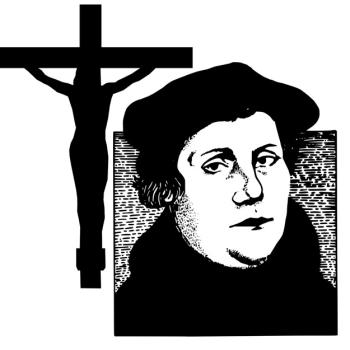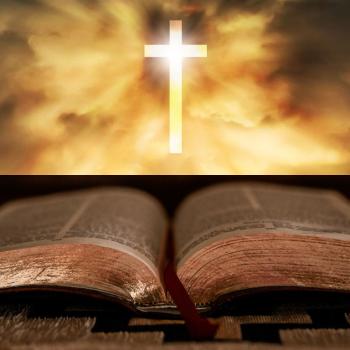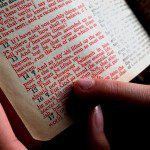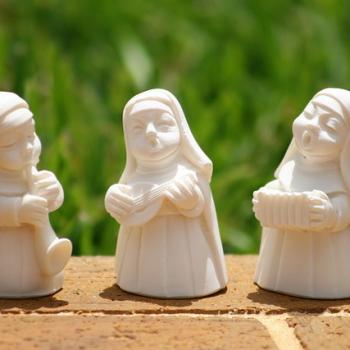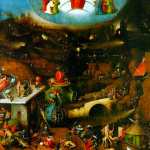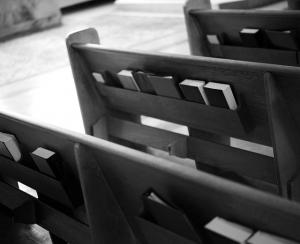
The discourse on Catholic X/Twitter this weekend was about the priesthood.
This conversation was started by an obvious troll account and nobody learned anything, but it got me thinking about the abuse crisis.
On about Saturday or Sunday, a cutesy-looking Twitter account with an AI profile picture tweeted an obnoxious bit of piosity: “You should never attack a priest, even when he’s in error, rather you should pray and do penance that God grant him grace again. When a priest falls, extend him a helping hand through prayer. God will be his judge. Whoever voices judgement over a priest has judged it over Christ.” This account was named “Fr. Fulbright,” and he claimed to be a real Catholic priest who was operating under an assumed name and photo so as to avoid being “canceled.”
Plenty of people jumped on Father Fulbright to tell him how dangerous it is to give priests a carte blanche in that way. Plenty more yelled at him because he’s previously supported Pope Francis and they were afraid this was more of the same. I also saw an alarming number of people retweeting the post in earnest, which frightened me.
As you’ve already guessed, it turns out that “Father Fulbright” is just some edgelord from Missouri with a troll account. But it got me thinking, because everybody took it so seriously. It was easy to assume he was a real priest because it’s the kind of thing a certain type of priest and his lackeys say. And there are still an awful lot of lay people who assume it’s correct.
If you’re Catholic, you’ve heard this exact line before.
I remember a similar page in the Pieta Prayerbook, growing up– a supposed locution from Christ Himself, demanding that we respond to priests’ errors by praying for them instead of correcting them.
I remember so many occasions where a friend or I would try to speak up against something a priest was doing, and a pious person would darkly hint, “It’s important to pray for priests” and not let the conversation go any further.
I remember standing up to bully priests here around Steubenville, before the full truth of all the sexual abuse around here was known, and people being shocked at me because you’re not supposed to stand up to priests.
I think about the entire rigmarole with my reporting on Frank Pavone, from his 2016 sacrilege until late 2023 where I was ultimately proven right. I was harassed and criticized endlessly for that, because you’re not supposed to criticize a priest, even when the priest is an obvious fraud.
And this is exactly how the Church got where it is today. This is how we got the sexual abuse crisis. This is why it happened and is still happening.
I’m not saying we can’t examine and question the rules regarding priestly celibacy; we ought to. But we did not get the sexual abuse crisis because priests can’t marry. We certainly can revisit the reasons women aren’t allowed to be priests and scrutinize them as well, but the all-male priesthood isn’t how we got the sexual abuse crisis. We absolutely need to look at how the Church treats queer people, and we have a lot of conspiracy theories to debunk, but neither gay men supposedly sneaking into seminaries nor the Church’s restrictions on queer people caused the sexual abuse crisis. The sexual abuse crisis came about because we were afraid to criticize priests.
Every community of people has had abusers in it. This has been true since caveman times and will continue until Jesus returns. A certain small percentage of the human population just don’t have functioning consciences, and they like to hurt the vulnerable. When humans form groups, those groups will have abusers in them. The abusers will always try to seek positions of authority, because those are the positions from which they can more easily abuse. This is constant. This happens in countries, political parties, schools, churches and clubs. One difference between a good and a bad community of people is that the good community admits they are vulnerable to abusers and is vigilant about stopping abuse when it happens. A bad community pretends that abuse doesn’t happen there and shields the inevitable abuser when he comes along. And the Catholic Church has been a bad community, because we have done the latter.
When you put priests on pedestals and insist they mustn’t be criticized, you’re grooming the whole community for abuse: not because all priests are abusers, but because abusers will see and take advantage of that pedestal.
When you claim that “attacking a priest” is the same as attacking Christ, you’re giving predators a convenient place to hide.
If you shame somebody who’s demanding accountability of a priest, you’re signaling to every rapist and child molester that the priesthood is an excellent place to shop for victims.
Besides, if you claim that a priest is the same as Christ– not as a clumsy way of saying that priests are in persona Christi when they administer the sacraments, but as if being ordained permanently transubstantiates a fallible person into Jesus– you’re committing idolatry and blaspheming Christ the Victim.
Christ IS a victim. We cannot deny this. Christ came to earth on purpose to suffer and die with other victims of injustice. He’s also a Priest, but He didn’t come to earth to aggrandize himself as a respectable authority nobody’s allowed to question. That’s not what priesthood is supposed to be about. When you stand up for a victim of injustice, you’re standing up for Christ. Claiming to be serving Christ by silencing victims is blasphemy.
And priests are not God. That’s not what being in persona Christi means. Only God is God. Only God is without sin or error. For everyone else, we have to follow the Golden Rule and treat them with respect, but we must demand accountability.
Holding priests accountable, and making it known that they’re held accountable, is the only way to stop abuse.
Mary Pezzulo is the author of Meditations on the Way of the Cross, The Sorrows and Joys of Mary, and Stumbling into Grace: How We Meet God in Tiny Works of Mercy.




